Finding Your Senior Mission: Medical Missionaries Help Young Missionaries Heal Physical and Emotional Ailments
Contributed By Bentlee Rice, ChurchofJesusChrist.org Church News staff writer

Sister Joan Turner poses in front of her train while traveling to Maribor, Slovenia.
Article Highlights
- Senior missionaries with medical experience are needed in missions around the world.
- Blessings from serving a senior mission were seen by many missionaries through their family lives.
- Senior missionaries can bless the lives and health of young missionaries through their service.
“This is a place of miracles, and it’s been a real amazing thing to come here and know that God is nearby and He’s watching over us.” —Elder Neil Hutchison, senior missionary at Church headquarters
Related Links
Sister Joan Turner knows that her contributions serving as a medical missionary have made an impact, especially when they saved the lives of young missionaries who didn’t have the medical experience to recognize life-threatening ailments that developed during their mission.
As she listens to the Spirit, “miracles occur,” she said, recalling a young man who came into the mission field with active tuberculosis. She helped him obtain proper medical care that saved his life. Young missionaries entering the field with ailments that would have been overlooked if not for their willingness to serve is “just one of the ways the Lord blesses them for their service,” she said.
Sister Turner has served medical missions on a Native American reservation in Arizona, at Church headquarters in Salt Lake City, in the Philippines, and in Croatia. She is currently serving in Australia with her sister. In each location, she has called on her 54 years of experience as a nurse and has loved every opportunity.
Her roles have ranged from finding safe medical care in Communist countries to screening missionary applications for health risks before senior missionaries receive their call to teaching CNA courses to locals.
But her service goes beyond medical care, she said. She has found friendships with the young missionaries and stays in contact with many she has helped. “It’s really fun to hang out with a bunch of young people whose lives are just beginning, to take care of them, get them on their feet, and say, ‘Now go,’ and they go off again serving the Lord,” she said.
Her missionary service has also blessed her family, she said. Her children know her love of the gospel and Jesus Christ, “even my kids that aren’t active. I keep going on missions so they have to keep coming to farewells and homecomings. I just have to keep going so I can get them to Church every once in a while,” she said, laughing.
Of the 399 missions in the world, 212 are currently lacking full-time medical missionaries or Church-service medical missionaries. Of the 185 that do have a mission nurse or doctor, there is continual turnover, so the need to replace the medical missionaries is ongoing.
“The senior missionaries are so appreciated and so badly needed. There are just not enough senior couples and senior sisters,” she said. And with so many missions, anyone can find a service opportunity they can be excited about.
She reassures anyone feeling a little nervous about being rusty in their medical expertise that “everything you need to know you learned at some point in your life. It may have been 50 years ago in school, but the Holy Ghost will bring it to your mind when you need it. It comes back. Trust Him, because He will.”
Sister Verlene Scott, who participated in medical service in Mali as a nurse before her mission, agreed. “Even though you may not feel as confident in your medical skills because you have not practiced in a while, your knowledge is needed in the mission field,” she said.
Sister Scott was shocked at the call to serve as a medical missionary in Kenya. When she submitted her papers, she did not know that a medical mission was an option. But she soon learned how her contributions would affect the missionaries in Kenya. As she started talking to people and went through some training, she felt relief, she said, because she knew she wasn’t being sent out there by herself. “The Church has all kinds of resources to help you succeed and help the missionaries succeed.”
While senior missionaries serving in health services for the Missionary Department don’t usually practice medicine, there are a variety of opportunities for medical missionaries to serve.
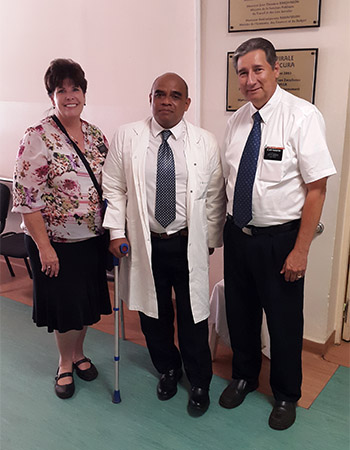
The Rossiters working with local medical resources on their senior mission in Madagascar. Photo courtesy of Michele Rossiter.
Sister Scott saw her contributions working with missionaries as being a “grandma-aged” friend nearby. “It didn’t matter if I was a nurse. It helped. But they felt confident in calling someone who was older that they were comfortable with. I think they felt confident and loved.”
While her husband was not a medical missionary, he was able to contribute in many other ways. He helped in the mission office, with housing, and in member leadership support. And she helped her husband in those endeavors when she did not have medical tasks.
“Both of us were working on the same thing, even though we had different positions,” said Sister Scott. She feels the mission strengthened their relationship as they were able to work together.
Like Sister Scott, many medical missionaries enter the field with a spouse who doesn't have a medical background.
Sister Michele Rossiter served in Madagascar with her husband from 2014 to 2016. She was a medical mission nurse, and her husband used his talents as a business owner to help with the Church’s self-reliance initiatives among the members of the Church.
“We both found great satisfaction,” she said, “and our kids were happy to see us being productive and doing good.”
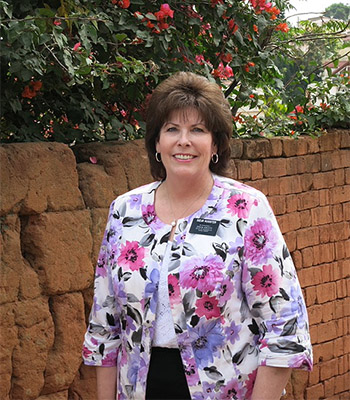
Sister Rossiter served a medical senior mission in Madagascar from 2014 to 2016. Photo courtesy of Michele Rossiter.
Their son also served in Madagascar two years prior to the Rossiters’ call, so Sister Rossiter knew what a comfort it is for parents to know there is a medical missionary in the field.
“I truly wanted to be a comfort to their mom that there was someone there with the missionary,” Sister Rossiter said. “It was being able to just be there for them in challenging circumstances that was impactful.”
“Serving in Madagascar was such an amazing experience. It was such a uniquely wonderful experience to serve there and to help missionaries be able to stay at their very best.”
Elder Greg Stevens, who served as a medical missionary in Mexico with his wife, Sister Peggy Stevens, found his contribution to be particularly meaningful to young missionaries. He worked as a doctor in internal medicine before he retired a few years before his mission. He also had served previously in Mexico as a young missionary. Seeing how his contributions helped fix many of the physical and mental health problems the missionaries were struggling with was very fulfilling, he said, adding that he felt the Savior’s love for everyone he served.
“Every day you are getting fulfilled with doing things that help other people and make other people happy, and touch the lives of the people. And that’s what you do day in and day out.”
Even though Sister Stevens didn’t speak Spanish, she was able to serve by helping the young sister missionaries with their health questions when they did not feel comfortable asking a man, Elder Stevens said. “I think that really, really helped the sisters to have a nurse there who knew how to help them with those things. And that was really fulfilling for her.”
They both found fellow missionaries to be a huge blessing in their lives. “The missionaries that work in the area office [are] just wonderful people, and we made some lifetime friends,” Elder Stevens said.
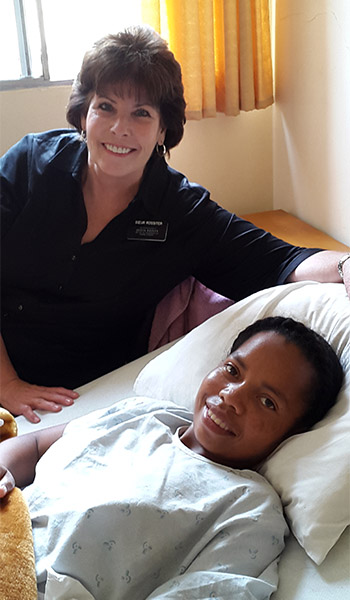
Sister Rossiter served a medical senior mission in Madagascar from 2014 to 2016. Photo courtesy of Michele Rossiter.
Sister Susan Hill currently serves as a missionary nurse screener at Church headquarters in Salt Lake City. She reviews incoming senior mission applications for health risks. She makes sure missionaries are safe to serve in their requested areas based on their medical histories.
Sister Hill has been a nurse since 1971 and finds it very fulfilling to use her medical experience to serve. Her favorite part is talking to future senior missionaries about their health and the places they may get to go. “I am just excited for them, because I remember how excited I was to get my mission call,” said Sister Hill.
She also is happy to be serving missions at the same time as her grandchildren and was working as a missionary when her grandson received his call.
Her granddaughter is also currently serving a mission, and Sister Hill will be released on the same day as her granddaughter. “That is a perk of being a senior missionary—not just setting the example but sharing it with your grandchildren when they go.”
She said, “The Lord needs His missionaries to be safe. And that’s what we do as medical people, and it’s been a thrill for me to use my nursing experience in this way. I will never ever regret pushing that submit button.”
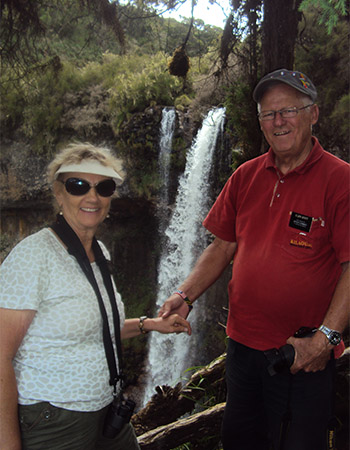
The Scotts served in a senior mission in Kenya. Sister Scott used her medical expertise to serve the mission. Photo courtesy of Verlene Scott.
Elder Neil Hutchison also serves as a medical screener at Church headquarters. He came from New Zealand as a family doctor to serve in Salt Lake. His wife serves as a family history missionary.
He applied to be an area medical adviser in New Zealand, because the office was 20 minutes away from his house, but he quickly realized that it would not be a possibility. There was a 10-year wait to serve as the medical adviser for the New Zealand mission.
So he sold his boat, and he and his wife faithfully submitted their papers, relying on faith to determine where they would go.
“I love coming to work,” he said. “The fact that you don’t get paid doesn’t seem to matter. Because you are having so much fun. It’s like a day fishing. Every day!”
Elder Hutchison said his faith is strengthened by the dedication of young missionaries. He remembers a missionary whose heart condition caused him to need a pacemaker. Even with health conditions that will most likely shorten the missionaries’ life, they still chose to go on a mission, said Elder Hutchison. “I think if my life was possibly going to be shortened by a thing like that, I might be tempted to choose something other than a mission.”
Because he is from a different country, he has a different perspective from many of the other missionaries. He is able to suggest changes to make the application process easier for missionaries from other countries, he said.
He also has gained a new perspective of the Church. “I always knew the Church was an amazing organization, but I really understand that now,” said Elder Hutchison. “This is a place of miracles, and it’s been a real amazing thing to come here and know that God is nearby and he’s watching over us.”
With so many opportunities to serve, knowing which mission to request may feel overwhelming. But if you have any kind of medical background, the decision may become easier after considering a Missionary Department Health Services opportunity.
“I sincerely believe one of the very best things we can do for our children and grandchildren is to leave them for a time as missionaries for the Lord Jesus Christ, inviting others to come unto Him through faith in Christ and His Atonement, repentance, baptism, receiving the gift of the Holy Ghost, and enduring to the end by serving in our assignment as medical missionaries,” said Elder Weatherford T. Clayton, assistant executive director in the Missionary Department and chairman of Missionary Health Services.
You can read more about medical missionaries’ experiences in a recent article by Church News.
Several different positions are open for those interested in serving within a medical capacity for the Church. Each offers its own need of expertise.
If you have any questions or interest serving in similar opportunities, contact senior missionary support at seniormission@ChurchofJesusChrist.org, or visit the senior missionary website.
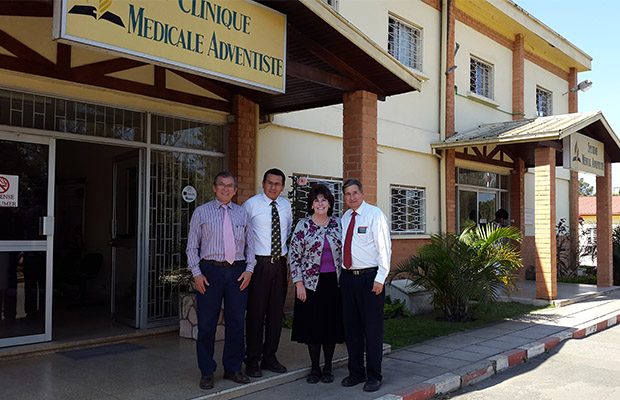
The Rossiters working with local medical resources on their senior mission in Madagascar. Photo courtesy of Michele Rossiter.
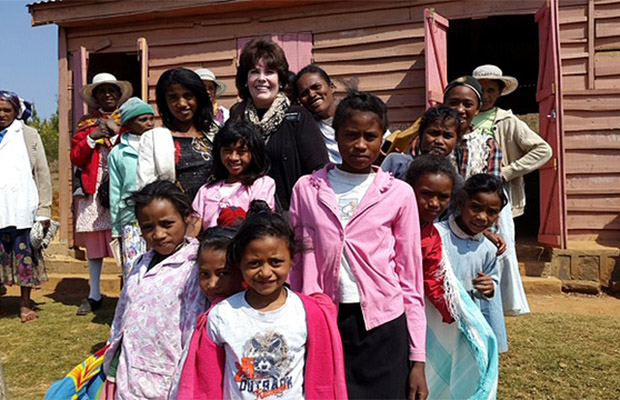
Sister Rossiter surrounded by children in Madagascar. She served a medical senior mission from 2014 to 2016. Photo courtesy of Michele Rossiter.
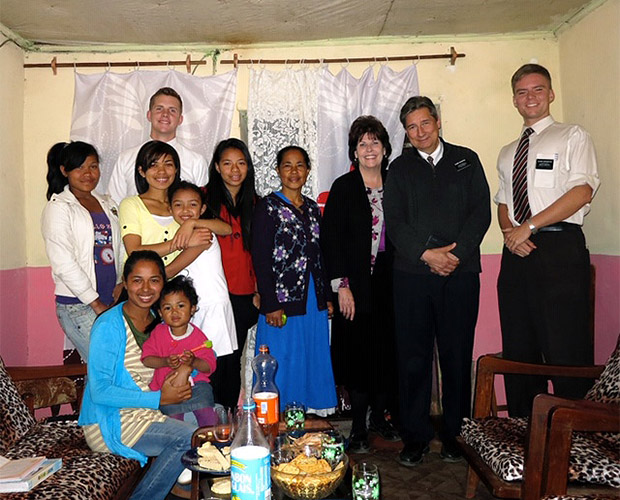
The Rossiters served a senior mission in Madagascar from 2014 to 2016. They served the people who lived there and the missionaries. Photo courtesy of Michele Rossiter.
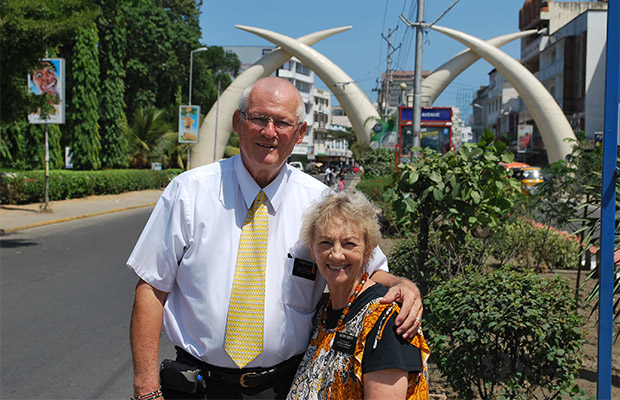
The Scotts served in a senior mission in Kenya. Sister Scott used her medical expertise to serve the mission. Photo courtesy of Verlene Scott.
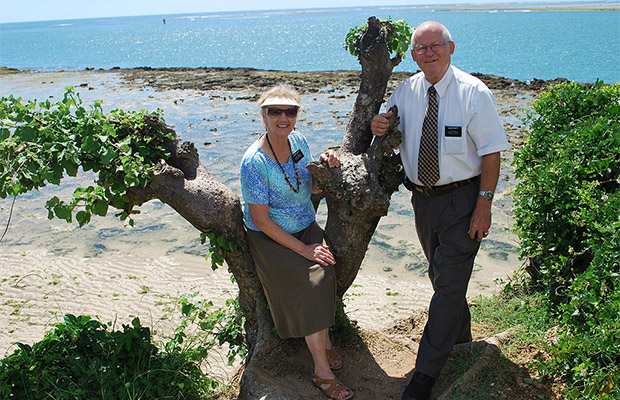
The Scotts served in a senior mission in Kenya. Sister Scott used her medical expertise to serve the mission. Photo courtesy of Verlene Scott.
